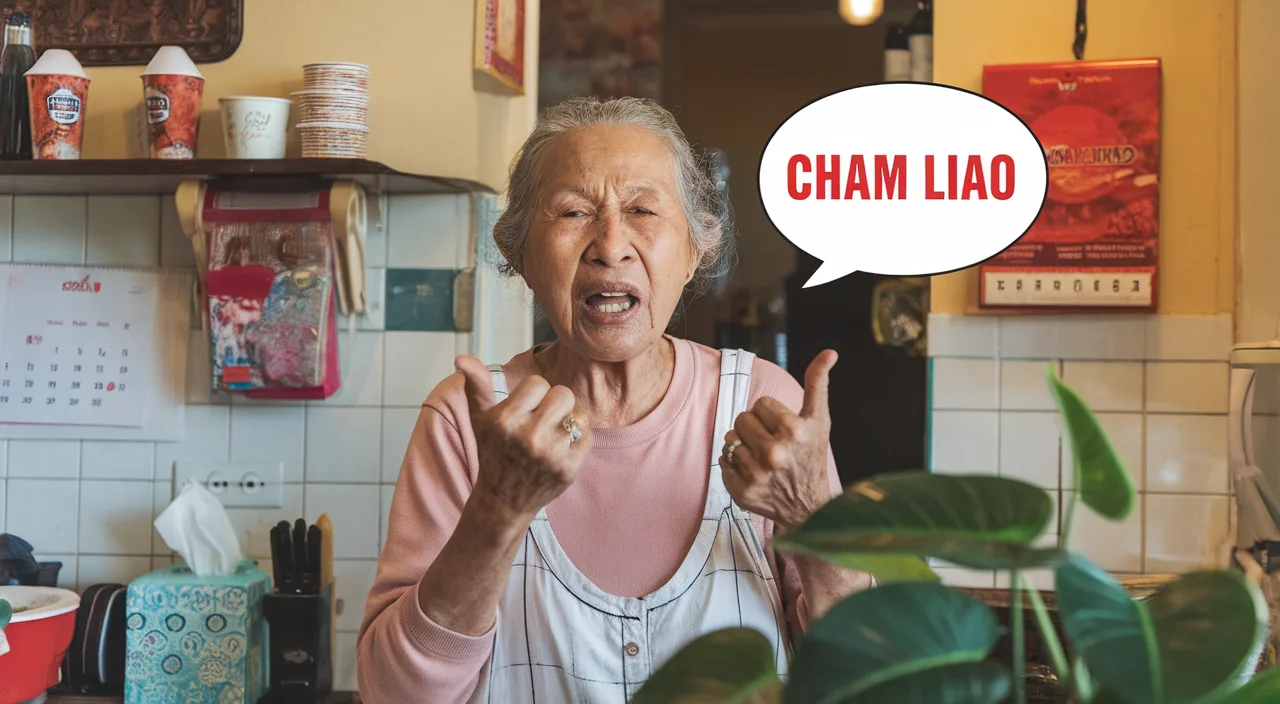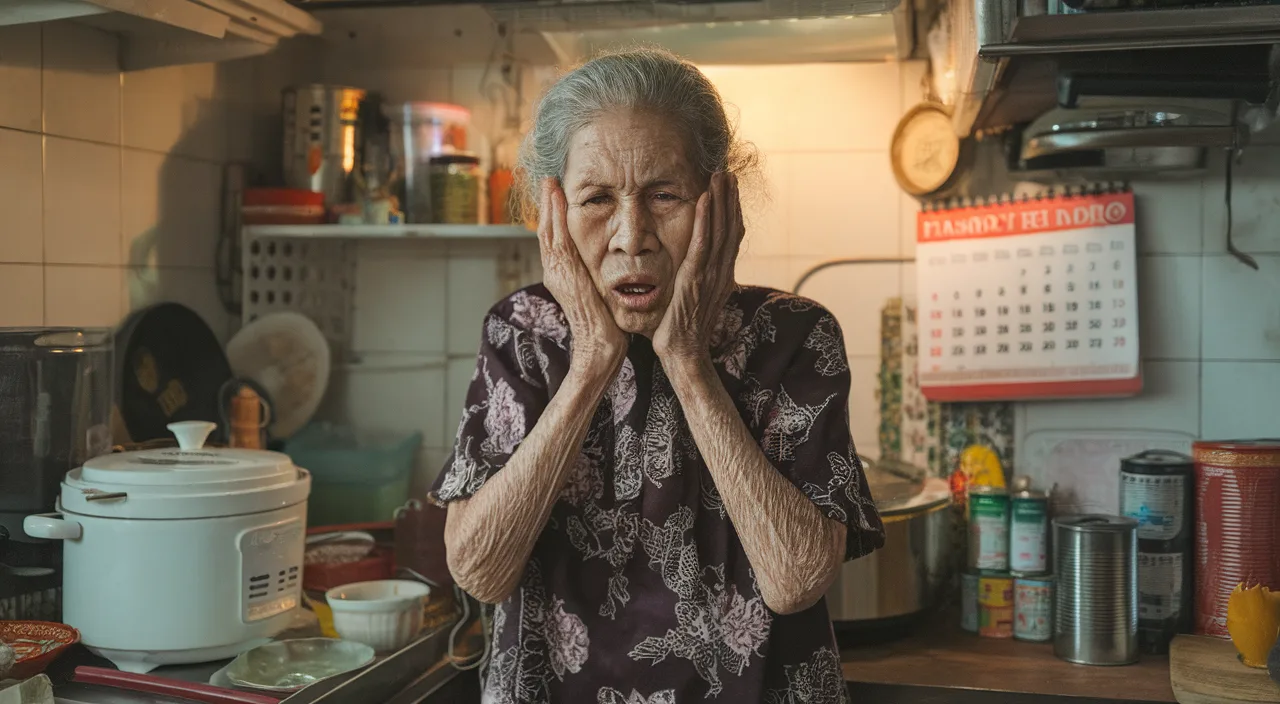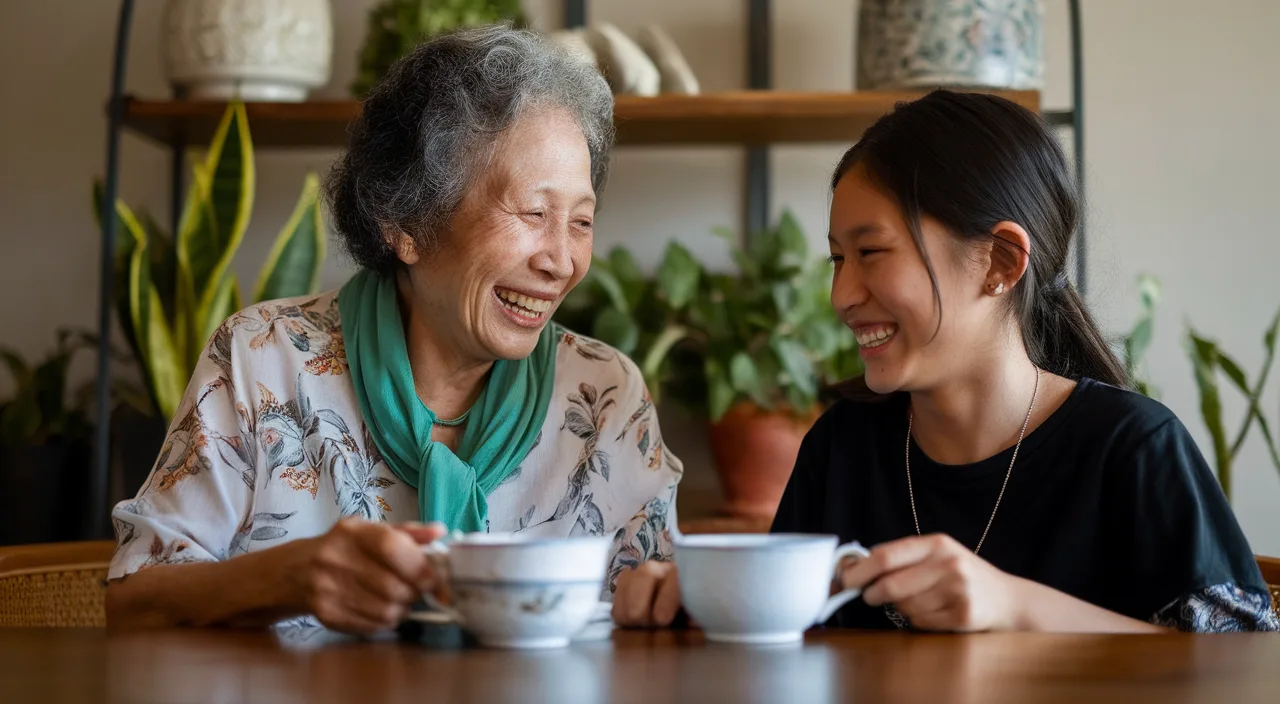Why Did Your Ah Ma Say ‘Cham liao’ Today?
Short Answer: Because something just went wrong, sideways, or completely off the rails—and she had the perfect Singlish phrase to sum it up!
-
Chinese, Chinese New Year, KaoBeiKing, T-shirts, Typography, Women
Price range: $30.00 through $38.00 Read more
- ‘Cham liao’ means ‘jialat already’, or ‘oh no, we’re in trouble’.
- Ah Mas use Singlish phrases to express emotion quickly and colorfully.
- It often pops out at dramatic moments – think burnt rice, broken washing machine, or a missed 4D number.
- ‘Cham liao’ is one of many Ah Ma’s expressions carrying unique cultural weight in Singaporean culture.
- This phrase bridges the generation gap in communication styles—we might say ‘GG liao’, but she’ll say ‘cham liao’.
- Understanding these moments helps us appreciate how Ah Ma’s expressions preserve our heritage.
Why Ah Mas Love Using Singlish
Ah Mas are the unofficial national poets of exasperation. Whether it’s an overcooked fish or the latest CPF policy update, they always know exactly what to say. And trust me, it’s never boring. For many of our grandmothers, Singlish phrases are linguistic shortcuts packed with emotion, humor, and history that define Singaporean culture.
Think about it. These resilient women grew up balancing kampung life, rationing coupons, and later, hawker stalls and HDB upgrades. The Singlish they use isn’t laziness—it’s survival language. Unlike textbook English, Singlish phrases like ‘cham liao’ are punchy, expressive, and get straight to the point. Why say “This is quite an unfortunate situation” when a simple “Cham liao” captures the drama perfectly?
It’s not just about efficiency; it’s about flavor. ‘Cham liao’ tastes like kopi-C siew dai—full-bodied, straight to the point, no time to waste. These Ah Ma’s expressions carry the essence of authentic Singapore living.
The Influence of Ah Mas on Singaporean Culture
Singapore is small, but our Ah Mas? Their influence on Singaporean culture is enormous. From how we cook to how we complain about the gahmen, their language trickles down into our everyday habits. And let’s be honest: sometimes, we hear their voices echoing in our own heads.
-
Price range: $30.00 through $38.00 Select options This product has multiple variants. The options may be chosen on the product page
-
Chinese, Chinese New Year, Ladies, Mens, T-shirts
Price range: $30.00 through $38.00 Select options This product has multiple variants. The options may be chosen on the product page
Whether it’s saving condensed milk tins for sewing kits or flipping pillowcases every Chinese New Year (must change luck lah!), Ah Mas shape our Singaporean culture in quiet yet powerful ways. For them, Ah Ma’s expressions like ‘aiyah’, ‘wah lao eh’, or today’s headliner, ‘cham liao’, aren’t mere words. They’re verbal heirlooms passed down from one kopi generation to another.
We say ‘slay’, they say ‘steady pom pi pi’. Different vocab, same energy. These Singlish phrases connect us to our roots while celebrating what makes us uniquely Singaporean.
Demystifying the Meaning of ‘Cham liao’
Here’s the breakdown: ‘Cham liao’ blends the Hokkien word ‘cham’ (惨), which roughly translates to ‘miserable’ or ‘terrible’, and the Singlish particle ‘liao’ meaning ‘already’. Put it together and you’ve got the perfect expression for when things go sideways.
Understanding Ah Ma’s expressions like ‘cham liao’ reveals how Singlish phrases efficiently communicate complex emotions. It means ‘it’s terrible now’, ‘we’re in trouble’, or ‘disaster has struck’.
Common scenarios where your Ah Ma uses ‘cham liao’:
- You spill rice on the floor: “Aiyo, cham liao, ants come already how?”
- Missed your job interview: “You hor… cham liao lah, how to explain?”
- The neighbor strikes 4D, but you never bought: “Cham liao, suay until like that.”
So don’t panic when you hear it—it’s just your Ah Ma’s way of being emotionally efficient. These Ah Ma’s expressions are windows into how our elders process and react to life’s daily dramas.
How to Interpret Ah Ma’s Expressions
Let’s be honest, deciphering some of Ah Ma’s expressions can make you blur like sotong. Here’s your guide to understanding her internal operating system and mastering understanding Ah Ma’s expressions:
-
$25.00 Select options This product has multiple variants. The options may be chosen on the product page
-
Chinese, Chinese New Year, Ladies, Mens, T-shirts
Price range: $30.00 through $38.00 Select options This product has multiple variants. The options may be chosen on the product page
- Facial expression: Eyebrow arch = mild disaster. Eyes widen + tsks = moderate disaster. Hand on forehead = ultimate doom.
- Volume: The louder the “Cham liao!”, the worse the outcome in her book.
- Paired words: If she adds “bo pian” (no choice), she’s resigning to fate. Mix it with “die lah” and you’re looking at DEFCON 1.
How your Ah Ma uses Singlish phrases like ‘cham liao’ in daily conversations depends on both the situation and her flair for drama (which, let’s face it, many Ah Mas are Olympic-level performers). It’s not just what they’re saying—it’s how they’re saying it that makes these expressions so rich in Singaporean culture.
One time, my Ah Ma lamented “cham liao” because her TOTO numbers were ‘one number off’. The despair in her tone could compete with a Korean drama finale—pure theatrical gold embedded in everyday Ah Ma’s expressions.
Bridging the Generation Gap Through Singlish
You might say ‘rip’, ‘bruh’ or ‘GG’. But your Ah Ma? She drops ‘cham liao’ like a perfectly timed punchline. Different language, same reaction—this is where Singlish phrases become bridges across generations.
This is where things get interesting for understanding Ah Ma’s expressions. By paying attention to old-school Singlish, we younger Singaporeans can connect back to our roots. It’s not just about nostalgia; it’s about appreciating communication styles born from different realities. You may have TikTok, but she survived the Japanese occupation, okay?
Bridging generational gaps through Singlish phrases isn’t about choosing one over the other. It’s about learning how language adapts and lives through us. Every time we adopt an expression from Ah Ma’s expressions repertoire, we’re keeping her spirit alive—one cheeky phrase at a time. This linguistic exchange enriches our Singaporean culture and keeps our heritage vibrant.
Embracing the Quirkiness of Ah Ma’s Speech
Maybe it’s the way she calls WhatsApp “Wasabi” or calls the TV “the box”. But amidst the chuckles, there’s something truly endearing about Ah Ma’s expressions. Every phrase, especially ‘cham liao’, reflects her resilience, adaptability, and pure Singaporean sass that defines our Singaporean culture.
If you’ve ever laughed and replied in Singlish, you’re already participating in this heritage language. These Singlish phrases are quirky, funny, and infinitely human. Local expressions are more than trends—they’re personality encoded into phonetics, carrying the DNA of our Singaporean culture.
So next time you hear her mutter, “Cham liao hor, this generation ah!”, don’t brush it off. Smile, and maybe reply, “Don’t worry Ah Ma, we steady one.” This simple exchange celebrates the beauty of understanding Ah Ma’s expressions and honoring our linguistic heritage.
Preserving Singlish for Future Generations
Here’s our final toast—to Ah Mas, Singlish phrases, and ‘cham liao’. In a world obsessed with Oxford commas and Grammarly alerts, Ah Ma’s expressions are our cultural rebellion—and a loving one at that, deeply rooted in Singaporean culture.
Preserving these golden expressions doesn’t mean rejecting ‘proper’ English. It means safeguarding the heritage encoded in our daily chatter. Understanding Ah Ma’s expressions connects us to our past while keeping our linguistic identity alive. These Singlish phrases are our bridge, our laugh track, our cultural alarm system (delivered in Ah Ma’s inimitable voice, no less).
Keep ‘cham liao’ alive. Use it. Love it. Teach it to your kids. And remember—when Ah Ma says it, pay attention. Something important just happened (most likely involving the rice cooker). By embracing Ah Ma’s expressions, we ensure that future generations will understand the rich tapestry of Singaporean culture woven through language.
Frequently Asked Questions
What does ‘Cham liao’ mean in Singlish?
It means ‘Oh no, we’re in trouble’ or something has gone badly. It’s a mix of Hokkien and Singlish commonly used to express panic, worry, or dramatic despair.
How do Ah Mas use ‘Cham liao’ in their daily life?
They usually say it in moments of minor crises—from burnt dinner to forgetting to buy pork belly. It’s their way of reacting instantly (and dramatically!) to problems.
Is ‘Cham liao’ considered rude?
No, it’s culturally accepted and even endearing. It’s expressive, not offensive, especially when coming from Ah Ma.
Why do younger generations still say ‘Cham liao’?
Because it’s catchy, intense, and hyper-relatable. Plus, it’s a way of honoring our elders’ speech while staying Singaporean to the core.
Can Singlish really bridge generational gaps?
Absolutely. It creates shared moments of understanding, humor, and emotional connection, especially when traditional English might feel too formal.
How do I explain ‘Cham liao’ to a foreign friend?
Try this: “It’s like saying ‘Uh-oh’ or ‘We’re doomed’, but with flavor!” Some drama required for authenticity.
Will Singlish ever disappear?
Not likely—as long as we keep integrating it into our daily language and passing it down through conversations like these.








